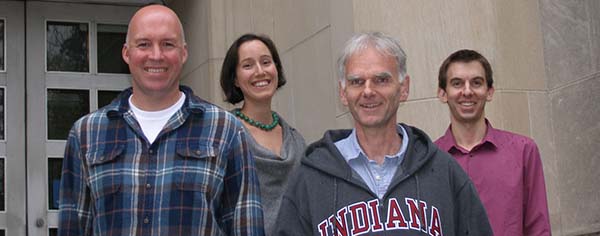Stephen D. Bell holds a joint appointment with the IU Department of Biology and the Department of Molecular and Cellular Biochemistry. One of the leaders in the field of DNA replication, his research area is the molecular biology of the single-celled microorganisms called the Archaea, also known as the third domain of life (along with the other two domains, the bacteria and so-called eukaryotes, including animals, plants, and fungi). Since arriving at IU, Bell, his graduate student Rachel Samson, and colleagues from the Montana State University published a high profile article, “Functional interplay between a virus and the ESCRT machinery in Archaea,” in the June 10, 2013, edition of Proceedings of the National Academy of Sciences. He came to IU from the University of Oxford, where he was the chair of microbiology at the Sir William Dunn School of Pathology.
Professor Volker Brendel holds a joint appointment in biology and the School of Informatics and Computing. He came to us from Iowa State University where he was the Bergdahl Professor of Bioinformatics. Brendel is at the forefront of the current genomic revolution, and effectively straddles the areas of computer science and genetics. His research focuses on genome informatics to understand the functional units in a genome, how their expression is controlled, and how they might have come to be what and where they are. He uses both computational and experimental approaches in his research and also devotes significant effort to developing bioinformatics databases and other data management tools.
Jay Lennon was an associate professor with the W. K. Kellogg Biological Station and the Department of Microbiology and Molecular Genetics at Michigan State University before joining our Evolution, Ecology, and Behavior Program. His research interests include microbial biodiversity, resource variability, ecology and evolution of viruses, and dormancy. Lennon has proposed that largely dormant and low abundance microbial populations in the environment act as “seed banks” for microbial groups that can proliferate in response to environmental conditions. This fundamental insight has great practical relevance for control and harnessing of microbial populations in environmental science, industry, agriculture, and medicine.
James “Jake” McKinlay was a postdoctoral fellow at the University of Washington before joining our faculty. There, he studied the metabolically versatile bacterium Rhodopseudomonas palustris with his mentor, Caroline Harwood. Professor Clay Fuqua served on McKinlay’s search committee and states that, “Jake is at the forefront of a new era of microbial physiology in which high resolution measurement of metabolic pathways is coupled with genome-wide expression profiling to predict and reveal the dynamic flux of cellular metabolism under different conditions. Jake’s work is enabling the engineering of microbes to be more efficient producers of biofuels and industrial chemicals.” McKinlay was honored twice in 2012, earning the Oak Ridge Associated Universities Ralph E. Powe Junior Faculty Enhancement Award and a five-year, $750,000 U.S. Department of Energy Early Career Research Program Award. Gina Gordon, BS’13, who was an undergraduate researcher in the McKinlay lab, received several awards for her research on photosynthetic biofuel-producing bacteria, funded in part by generous gifts from alumni and friends. McKinlay also teaches a course on microbial physiology in which students use course concepts, primary scientific literature, and their own imaginations to design a microbial process for producing fuels, chemicals, or solving other societal problems of their own choosing.
Irene Garcia Newton came to IU from Wellesley College, where she was an assistant professor. Her research interest spans many areas of biology, including environmental microbiology, symbiosis, genomics, and evolution. Using comparative genomics and a yeast model system, Newton investigates type IV secretion substrates of the bacterium Wolbachia pipientis, which is an intracellular symbiont in many different insects, including fruit flies, and has profound effects on insect evolution. Her research will be promoted wonderfully at Indiana University due to access to the world’s largest collection of Drosophila melanogaster (fruit fly) mutants housed in Jordan Hall. The Newton lab also has significant efforts focused on the microbial community (or microbiome) of honey bees and how these microbes impact bee health. In recent years honey bee populations have suffered great losses and the underlying causes remain to be determined. Her research aims to explore the role of resident bacteria in promoting bee health. Here at IU, Newton is active with a variety of women in science initiatives.
Dean Rowe-Magnus came to us from the University of Toronto and the Sunnybrook Research Institute, where he built a robust research program since 2002. His research involves studying the impact of horizontal gene transfer on the evolution of bacterial genomes, including several very important human pathogens such as Vibrio cholera (causative agent of the water-borne disease cholera) and Vibrio vulnificus (the primary agent for food-borne human illness caused by shellfish consumption). Rowe-Magnus’s work focuses particularly on integrons, potent tools for rapid adaptation that allow bacteria to acquire novel genetic traits from the surrounding environment, including genes coding for antibiotic resistance. He also studies the regulation of polysaccharide biosynthesis and biofilm formation in vibrios. His lab uses in vivo genetic techniques, whole genome sequencing and expression analysis, and in vitro biochemical analysis to study the mechanisms that allow the vibrios to be such successful environmental organisms and potent human pathogens.
Jason Tennessen, who was hired as an assistant professor, joined the department in January 2014. He was a postdoctoral fellow in the Department of Human Genetics at the University of Utah. Tennessen’s research interests include metabolic diseases and systems biology as they relate to cancer, using fruit flies as a model system. Again, our renowned faculty and resources in Drosophila genetics were a major attraction for Tennessen joining IU. He earned his Ph.D. in Molecular, Cellular, Developmental Biology and Genetics from the University of Minnesota in 2007.

 The College of Arts
The College of Arts